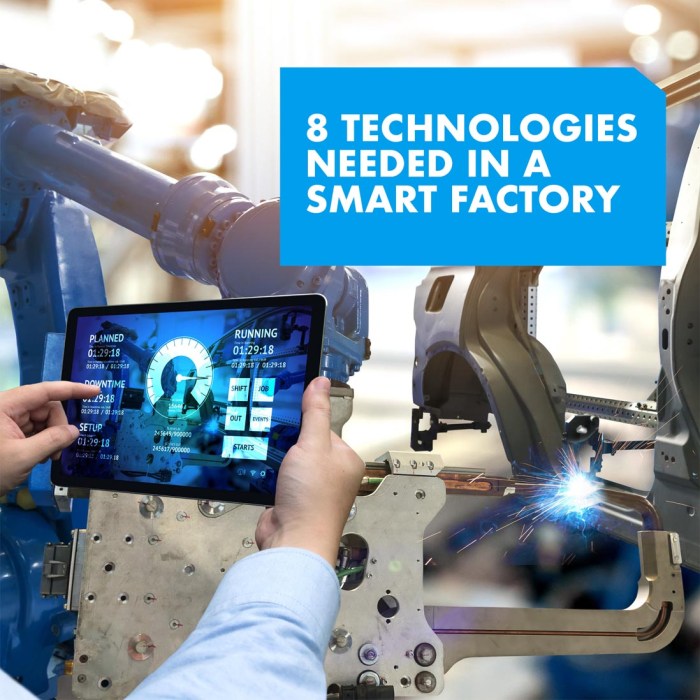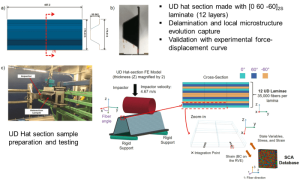
Smart factories technologies sets the stage for this enthralling narrative, offering readers a glimpse into a story that is rich in detail with entertaining interactive style and brimming with originality from the outset.
Get ready to dive into the world of smart factories where innovation meets industry, and technology takes center stage in transforming manufacturing processes.
Overview of Smart Factories Technologies
Smart factories, also known as Industry 4.0 or the fourth industrial revolution, refer to manufacturing plants that utilize advanced technologies such as automation, robotics, artificial intelligence, and the Internet of Things (IoT) to streamline processes and improve efficiency.
Integrating technology in manufacturing processes is crucial to keep up with the demands of the modern market and stay competitive. By implementing smart factories technologies, companies can enhance productivity, reduce costs, and deliver higher-quality products to consumers.
Importance of Implementing Smart Factories Technologies
- Increased Efficiency: Automation and data analytics optimize production processes, leading to faster output and reduced downtime.
- Cost Savings: Smart factories help minimize waste, lower energy consumption, and cut operational expenses.
- Enhanced Quality Control: Sensors and monitoring systems ensure consistent product quality, reducing defects and enhancing customer satisfaction.
- Real-time Decision Making: Data-driven insights enable quick adjustments and improvements in real-time, enhancing overall performance.
Benefits of Implementing Smart Factories Technologies
- Improved Productivity: Automation and connectivity streamline workflows, increasing output and efficiency.
- Enhanced Safety: Robotics and AI can handle dangerous tasks, reducing the risk of accidents for workers.
- Flexibility and Adaptability: Smart factories can easily adjust to changes in demand and production requirements, ensuring agility in the manufacturing process.
- Sustainable Practices: By optimizing resource usage and reducing waste, smart factories contribute to a more environmentally friendly approach to manufacturing.
Key Technologies in Smart Factories

The implementation of various cutting-edge technologies plays a vital role in the transformation of traditional manufacturing facilities into smart factories. These technologies not only enhance operational efficiency but also drive productivity to new heights.
Internet of Things (IoT)
IoT enables the connection of physical devices and machines to the internet, allowing them to communicate and exchange data in real-time. In smart factories, IoT sensors collect and transmit valuable information about equipment performance, production processes, and inventory levels. This data can be utilized for predictive maintenance, inventory optimization, and process automation, leading to reduced downtime and improved overall efficiency.
Artificial Intelligence (AI)
AI solutions such as machine learning algorithms and predictive analytics are utilized in smart factories to analyze large volumes of data and identify patterns or anomalies. By leveraging AI, manufacturers can optimize production schedules, predict equipment failures, and enhance quality control. AI-powered robotics and automation systems can perform repetitive tasks with precision and speed, further streamlining operations and increasing productivity.
Robotics
Robotics technology in smart factories involves the use of autonomous machines and robotic arms to perform complex manufacturing tasks with accuracy and consistency. Collaborative robots, known as cobots, work alongside human workers in assembly lines, enhancing production efficiency and ensuring worker safety. Robotics also enables the customization of products through flexible manufacturing processes, catering to changing consumer demands in real-time.
Real-World Applications
- In automotive manufacturing, IoT sensors are used to monitor machine health and optimize production workflows, reducing maintenance costs and minimizing downtime.
- AI-powered predictive maintenance systems in the aerospace industry analyze equipment data to forecast potential failures, enabling preemptive repairs and avoiding costly unplanned downtime.
- Robotics-assisted assembly lines in electronics manufacturing ensure precise component placement and soldering, improving product quality and accelerating production cycles.
By harnessing the power of IoT, AI, and robotics, smart factories are revolutionizing the manufacturing industry, driving operational excellence and paving the way for a more connected and efficient future.
Challenges in Implementing Smart Factory Technologies
Implementing smart factory technologies can bring about numerous benefits for industries, such as increased efficiency, reduced downtime, and improved quality control. However, there are several challenges that companies often face when adopting these advanced technologies. Overcoming these challenges is crucial for the successful implementation of smart factories.
Integration of Legacy Systems
One of the major challenges in implementing smart factory technologies is the integration of existing legacy systems with new digital technologies. Many factories still rely on outdated systems that may not be compatible with the latest smart manufacturing solutions. This can lead to issues with data sharing, communication between systems, and overall efficiency. To overcome this challenge, companies need to invest in interoperable technologies and develop a clear roadmap for integrating legacy systems with new smart technologies.
Data Security and Privacy Concerns
Another significant challenge is ensuring the security and privacy of data collected by smart factory technologies. With the increase in connected devices and sensors, there is a greater risk of cyber-attacks and data breaches. Companies need to implement robust cybersecurity measures, such as encryption, access control, and regular security audits, to protect sensitive data. Additionally, companies must comply with data privacy regulations to maintain trust with customers and stakeholders.
Workforce Training and Skills Gap
As smart factory technologies become more prevalent, there is a growing need for skilled workers who can operate, maintain, and troubleshoot these advanced systems. However, many industries are facing a skills gap, with a lack of workers trained in digital technologies and automation. To address this challenge, companies can invest in training programs, upskilling existing employees, and collaborating with educational institutions to develop a pipeline of talent with the necessary skills for smart manufacturing.
Cost of Implementation
The cost of implementing smart factory technologies can be a barrier for many companies, especially small and medium-sized enterprises. From initial investment in hardware and software to ongoing maintenance and upgrades, the financial burden of adopting these technologies can be significant. To mitigate this challenge, companies can explore financing options, such as government grants or loans, and conduct a thorough cost-benefit analysis to assess the return on investment of smart factory technologies.
Change Management and Organizational Culture
Introducing new technologies and processes in a manufacturing environment can disrupt existing workflows and require a cultural shift within the organization. Resistance to change from employees, lack of buy-in from leadership, and inadequate change management strategies can hinder the successful implementation of smart factory technologies. Companies need to involve employees in the transition, provide training and support, and foster a culture of innovation and continuous improvement to overcome these challenges.
Supply Chain Integration
Smart factory technologies rely on seamless integration with the entire supply chain, from suppliers to customers. Coordinating processes, sharing real-time data, and ensuring visibility across the supply chain can be complex and challenging. Companies need to establish strong partnerships with suppliers, implement supply chain management systems, and leverage technologies like IoT and blockchain to improve visibility, traceability, and collaboration throughout the supply chain.
Future Trends in Smart Factory Technologies
The future of smart factory technologies holds exciting possibilities that could revolutionize the manufacturing industry. Emerging technologies are set to shape the way factories operate, bringing both benefits and risks.
Internet of Things (IoT) Integration
The integration of IoT in smart factories allows machines, devices, and sensors to communicate and exchange data in real-time. This connectivity enhances operational efficiency, reduces downtime, and enables predictive maintenance.
Artificial Intelligence and Machine Learning
AI and machine learning algorithms are becoming increasingly prevalent in smart factories. These technologies enable predictive analytics, process optimization, and automation of decision-making processes, leading to improved productivity and quality control.
Additive Manufacturing (3D Printing)
3D printing is revolutionizing the manufacturing process by enabling rapid prototyping, customization, and on-demand production. This technology reduces waste, shortens lead times, and opens up new design possibilities for manufacturers.
Cyber-Physical Systems
Cyber-physical systems combine computational and physical elements to monitor and control production processes autonomously. These systems enable real-time adjustments, self-optimization, and adaptive manufacturing, leading to increased flexibility and agility.
Industrial Goods and Services in Smart Factories

Industrial goods and services play a crucial role in supporting the operations of smart factories. These goods and services are essential components that enable the smooth functioning of automated processes and data-driven decision-making.
Role of Industrial Goods and Services
Industrial goods such as sensors, actuators, robotics, and advanced machinery are used in smart factories to collect and analyze real-time data, optimize production processes, and ensure quality control. Services provided by suppliers include maintenance, technical support, and training to enhance the capabilities of smart factory systems.
- Suppliers and Manufacturers Collaboration:
In smart factories, suppliers and manufacturers collaborate closely to optimize supply chains by ensuring timely delivery of industrial goods, maintaining inventory levels, and implementing just-in-time production strategies. This collaboration helps in streamlining operations and reducing costs.
Impact of Quality Industrial Goods and Services
Quality industrial goods and services have a significant impact on the overall efficiency of smart factories. Reliable and high-performance equipment ensures smooth operations, reduces downtime, and enhances productivity. Additionally, timely maintenance and technical support services help in preventing breakdowns and optimizing the performance of smart factory systems.
Ending Remarks
As we conclude our exploration of smart factories technologies, it’s evident that the future of manufacturing is intertwined with the advancements in technology, promising a more efficient and productive industrial landscape ahead.
User Queries
What are the main technologies used in smart factories?
The main technologies include IoT, AI, and robotics, each playing a crucial role in enhancing efficiency and productivity.
What challenges do industries face when adopting smart factory technologies?
Common challenges include integrating new technologies, cybersecurity risks, and upskilling the workforce to adapt to technological changes.
How do industrial goods and services support smart factory operations?
Industrial goods and services play a vital role in optimizing supply chains, ensuring quality components for manufacturing processes.





